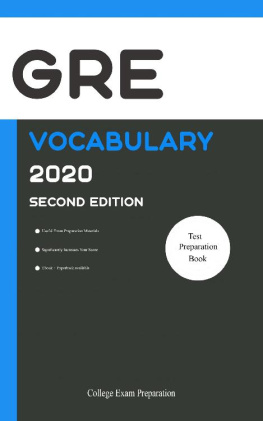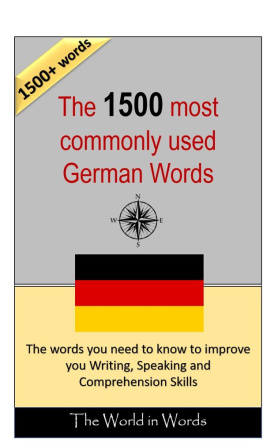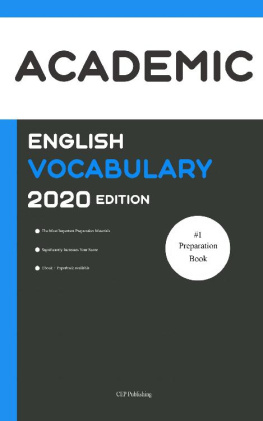GRE Vocabulary 2020 Second Edition: All Words You Should Know to Successfully Complete Writing/Essay Part of GRE Test by College Exam Preparation Copyright 2020 College Exam Preparation collegeexampreparation@gmail.com All rights reserved. No part of this book may be reproduced, stored in a retrieval system, or transmitted in any form or by any means, without the prior written permission of the author, except in the case of brief quotations embedded in critical articles or reviews. Table of Content
Introduction
This book contains all the most important words that you need to know to successfully complete writing/essay part of GRE test. This material is perfect for any serious candidate who does not wish to waste time researching and learning new vocabulary the traditional way. This book will make your learning more efficient with less of your own effort, which means more spare time to review other concepts. This is not just a regular dictionary with a bunch of words.
In this little vocabulary you can find only the most necessary definitions from the official examination materials. Knowing these words will definitely surprise your examiner, in a good way.
Vocabulary
Agile When someone or something is agile, it can deal with changes quickly and successfully. An agile company is able to adapt quickly and easily adapt to all changes and complexities. Alacrity Brisk and cheerful readiness; quickly and with enthusiasm. Alleviate Means to make something easier to deal with or endure; to make something bad less severe.
Allusion Is a figure of speech that makes a reference to a place, person, or event. This can be real or imaginary and may refer to anything, including fiction, folklore, historical events, or religious manuscripts (for example: When she lost her job, she acted like a Scrooge, and refused to buy anything that wasnt necessary). Amalgamate To bring together, unite; to combine different things to create something new. Ambiguous Means unclear or vague in meaning; having more than one possible meaning. Amend Means to make minor changes to the text (piece of legislation, etc.) in order to make it more fair or accurate, or to reflect changing circumstances. Amicable Means friendly, agreeable; characterized by or showing goodwill, peaceable.
Anachronistic Out-of-date, not attributed to the correct historical period. Annex Attach to; add as an extra or subordinate part, especially to a document. Apotheosis Is the glorification of a subject to divine level; the highest point in the development of something; a culmination. Appease Make peace with; pacify or placate (someone) by acceding to their demands (for example: She claimed that the government had only changed the law in order to appease their critics). Appraisal Means a formal assessment, typically in an interview, of the performance of an employee over a particular period. Apprise Means to inform somebody of something (for example: We must apprise them of the dangers that may be involved).
Arcane Requiring secret or mysterious knowledge; understood by few; mysterious or secret. Archetype Means something that is considered to be a perfect or typical example of a particular kind of person or thing, because it has all their most important characteristics. For example, the United States is the archetype of a federal society. Arid Means extremely dry or deathly boring. If you describe something, such as a period of your life, as arid, you mean that it has so little interest, excitement, or purpose that it makes you feel bored or unhappy. Aspersion Is a damaging or disparaging remark or criticism; slander.
Assertion Is a statement, usually backed up by some kind of solid proof or reasoning; a confident and forceful statement of fact or belief. Assiduous Means persistent, hard-working. If you call someone assiduous, it means they're careful, methodical and very persistent. Assumption Something that you consider likely to be true even though no one has told you directly or even though you have no proof. Attendee Participant or a person who attends a conference or other gathering. Avail To be of use, help, worth, or advantage (to), as in accomplishing an end (for example: My attempts to improve the situation were of little/no avail).
Avarice Means greedy desire for wealth or material gain. Bellicose Inclined or ready to fight; aggressively hostile. Benevolent Friendly and helpful; characterized by or expressing goodwill or kindly feelings. Bewilder To become perplexed and confused (for example: Beware of false people and situations that may bewilder you temporarily). Bias Means the action of supporting or opposing a particular person or thing in an unfair way or different from the way you treat other people. Blare Means to make a loud and unpleasant noise (for example: If something such as a siren or radio blares or if you blare it, it makes a loud, unpleasant noise).
Boon Something that is desirable, favorable, or beneficial. Brackish Means distasteful and unpleasant (for example: Brackish water is slightly salty and unpleasant). Brazen Obvious, without any attempt to be hidden. If you describe a person/behavior as brazen, you mean that they are very bold and don't care what other people think about them or their actions. Burgeon To develop, expand, or grow rapidly. Camaraderie Brotherhood, partnership, jovial unity, sociability amongst friends.
Candor The quality of being honest and straightforward. Cantankerous Means ill humored, irritable, marked by ill-tempered contradiction or opposition, ugly, malicious. Castigation To criticize someone or something severely; verbal punishment. The word comes from the Latin castigus which means to make pure. Cavil To raise irritating and trivial objections; to argue or protest about unimportant details. Circuitous Indirect, taking the longest route (for example: A circuitous journey/path is longer than it needs to be because it is not direct).
Circumlocution Can be described as the use of too many words to say something, especially in order to avoid saying something clearly; an indirect way of expressing something. Clause In business law, clause refers to a statement or term in the contract (for example: We must carefully consider these clauses in the contract). Coercion Means persuading someone to do something by using force or threats. In law, coercion is codified as a duress crime. Such actions are used as leverage, to force the victim to act in a manner that is contrary to their own interests. Cogent Reasonable and convincing; based on evidence; forcefully persuasive.
Cognitive Relating to the mental process involved in knowing, learning, and understanding things. Coincide Means to happen at or near the same time or during the same period, to occupy exactly the same space. Comity Is a state or atmosphere of harmony or mutual civility; polite and considerate behaviour towards others based on mutual respect. Commensurate Equal in significance; corresponding in size or degree. Concede Means to admit or accept that something is true after first denying or resisting it. Conciliation Is the act of placating and overcoming distrust and animosity; the action or process of ending a disagreement.
Condescending Showing or characterized by a patronizing or superior attitude toward others. Confidant Means someone to whom private matters are told. A confidant is the person you tell your secrets to. Conformity Is the act of matching attitudes, beliefs, and behaviors to group norms. This tendency to conforms to small groups and/or society as a whole, and may result from subtle unconscious influences, or direct and overpressure. Conformity can occur in the presence of others, or when an individual is alone.
Connotation Is a feeling or idea that is suggested by a particular word although it need not be a part of the words meaning, or something suggested by an object or situation (for example, the word lady has connotations of refinement and excessive femininity that some women find offensive). Consensus An idea or opinion thats been agreed on by everyone (For example: After a four-hour meeting, they still couldnt come to a consensus, so theyll be meeting again next month). Construe Make sense of; to understand the meaning, especially of other people's actions and statements, in a particular way. Contention The disagreement that results from opposing arguments; the act of competing as for profit or a prize. Contravene Go against, as of rules and laws. Convergence The state of separate elements joining or coming together (for example: If roads or paths converge, they move towards the same point where they join).
Next page












